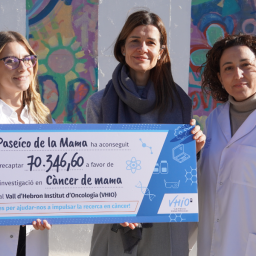
The results of the SOLTI-2103 VALENTINE clinical trial demonstrate that the antibody drug conjugate (ADC) patritumab deruxtecan at the standard dose and schedule offers a treatment with fewer serious side effects compared to conventional chemotherapy, while maintaining efficacy, in patients with early hormonal breast cancer.
Of the patients treated with chemotherapy, 45.8% experienced serious side effects, while these only occurred in around 14% of patients treated with patritumab deruxtecan -alone or in combination with letrozole-, a reduction of 70% of cases with similar rates of pathological complete response -absence of detectable disease after the treatment-. These results were presented today during the San Antonio Breast Cancer Symposium, held in Texas (USA) (Abstract #LB1-06, 18:00-19:00 ET).
The VALENTINE study evaluates, for the first time in early hormonal breast cancer, the efficacy and safety of the antibody drug conjugate or ADCdirected against HER3- patritumab deruxtecan -alone or in combination with endocrine therapy- compared to standard therapy consisting of administering 3 classical chemotherapy drugs. ADCs are very potent drugs formulated to deliver therapeutic concentrations to the tumor site and not to healthy tissues, which may help to explain their better tolerability. Promoted by the SOLTI cancer research group, the VALENTINE study is led by Dr. Aleix Prat, director of the Clínic Barcelona Comprehensive Cancer Center, and Dr. Mafalda Oliveira, president of SOLTI and medical oncologist at Vall d’Hebron and senior reseracher at Breast Cancer Group at VHIO.
Dr. Aleix Prat, principal investigator of the VALENTINE trial, states: “In hormone sensitive early breast cancer there have been no major advances in terms of chemotherapy treatment. Therefore, VALENTINE evaluates whether with a biologic drug that delivers a very potent targeted chemotherapy (patritumab deruxtecan) we can potentially achieve similar results to those that would be obtained with an intense standard chemotherapy regimen”.
In this line, Dr. Mafalda Oliveira, principal investigator of the study, states: “VALENTINE has confirmed our suspicions: treatment with patritumab deruxtecan produces fewer serious side effects, i.e. grade 3 or higher, than treatment with classical chemotherapy in this group of patients, with similar efficacy. Thus, and consequently, fewer dose reductions, interruptions and discontinuations due to these adverse effects have been observed. In addition, it is noteworthy the number of patients who manage to complete treatment, which we know has an important impact on the efficacy of the treatment”.
This trial arose after the evidence from the TOT-HER3 study, which demonstrated the activity of this drug in hormonal breast cancer and “made us think that we should test this drug in a larger study, to take a step forward,” adds Dr. Prat.
In oncology, and especially in breast cancer, there are currently a large number of new drugs, so it is essential to identify the most suitable patients to receive each type of treatment. “This can only be achieved if we use biomarkers that are predictive of response and toxicity to treatments. Window of Opportunity clinical trials are a way to identify biomarkers of response to new drugs and then validate them in larger studies to identify more efficacy or less toxicity than the standard of care. Academic groups such as SOLTI have a clear vocation for translational research that allows us to optimize the selection of patients for each treatment and the example of the passage from the TOT-HER3 study (window study) to a larger study, VALENTINE (phase II study) is paradigmatic to prove that this type of research works to treat more and better”, concludes Dr. Oliveira.
Finally, Dr. Prat notes: “After the results from SOLTI-2103 VALENTINE, the next step will be to evaluate the combination of patritumab deruxtecan with immunotherapy to validate possible synergies between the two and further enhance the response of this drug”
About SOLTI-2103 VALENTINE clinical trial
VALENTINE evaluates the usefulness of the antibody drug conjugate patritumab deruxtecan versus classical chemotherapy in early hormone sensitive/HER2negative disease and follows evidence from SOLTI’s previous trial, TOT-HER3, which demonstrated the activity of this drug in hormonal breast cancer, with data published in Annals of Oncology and Nature Communications.
The TOT-HER3 study is a paradigmatic example of how a drug that has already been tested in metastatic disease can be efficiently tested in the early setting and how to articulate how to bring this new therapeutic option to patients who have never been treated before. Window opportunity studies, such as this one, do not delay drug development for long and help to obtain key information, which is then confirmed by larger studies, in this case VALENTINE.
Promoted by SOLTI, VALENTINE is a Phase II neoadjuvant study that has included 120 patients from 21 Spanish hospitals and is made in collaboration with the pharmaceutical companies Daiichi Sankyo and Merck & Co.
About SOLTI
SOLTI is a leading cooperative group in the field of clinical cancer research. With a consolidated track record of more than 25 years, its main activity focuses on the design and execution of translational clinical studies within the academic field. The main focus is on breast cancer, but its scope covered includes other tumors. With the accumulated experience of 115 clinical trials and more than 30 in progress, SOLTI gathers the work of 550 researchers from a network comprising more than 100 hospitals in Spain, Portugal and Ireland all coordinated by a team of more than 70 employees from the headquarters. SOLTI is a member of the Spanish Society of Medical Oncology (SEOM) and, in addition to its scientific activity, has a Medical and Patient Education program with multiple annual initiatives. SOLTI’s mission is to utilize disruptive means to develop innovative research that will improve the well-being and future outcomes of cancer patients.
To find out more about SOLTI, visit www.gruposolti.org




















